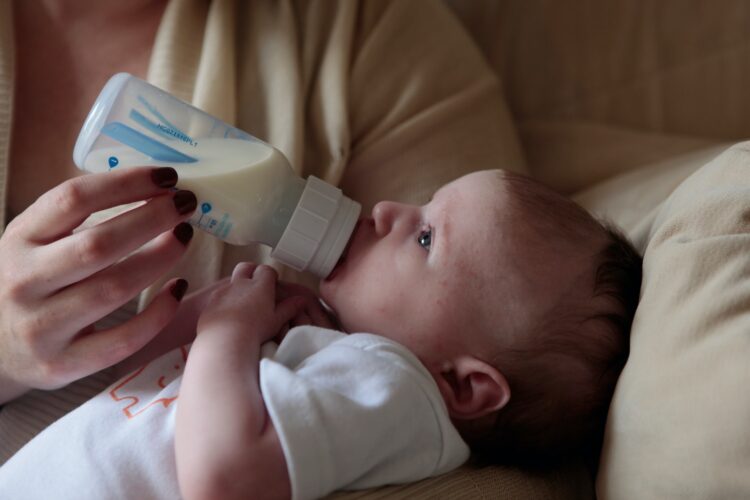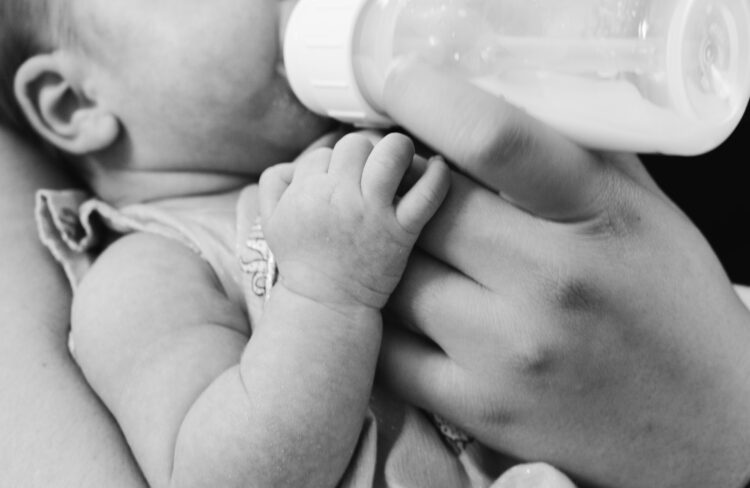Imagine being in the hospital trying to breast feed your newborn baby. You think everything is going good with breastfeeding, only to find out on the last day at the hospital that your child is not getting enough to eat. You keep trying at home, but still with all the different methods suggested, you are not producing enough.
This not your first time as a mom, but you were hoping that this time you would be successful with breastfeeding. Many moms have reached this point, and are full of guilt, shame, and anxiety. Thankfully, that mom guilt can be completely minimized when you find a formula that works for your baby and has clean ingredients as well. Click here for our suggested option.
This article is for all those moms searching for the clean ingredients baby formula that their little one deserves. This is why we discuss the benefits of choosing a European organic baby formula.
Page Contents
What do European Organic Baby Formulas Have to Offer?

Source: unsplash.com
Formulas made in Europe go through very strict screening and are not allowed to have several different ingredients.
The ingredient’s that you will never find in European baby formulas are:
1. Soy: Soy should only be used as a last resort when all other formulas have failed to work. Soy contains phytoestrogens, phytic acid, and genistein which can hormone issues for both boys and girl once they reach puberty.
2. Heavy Metals: Heavy metal like arsenic, cadmium, and lead are found naturally in the soil. Without proper regulation, these metals can be missed in the filtering process and create harmful effects on a baby’s developing brain, cardiovascular, and immune systems.
3. Melamine: Melamine is a chemical used to increase milk production in dairy cows. Babies can overdose on this chemical when it is used in infant formulas. This was originally found in baby formulas made in China but was most recently found in US formulas.
4. Gluten: Gluten is found in many different foods, for example, bread and pasta. Gluten is typically fine for older kids and adult, but for infants and babies it can cause digestive issue. In the first year of a baby’s life the digestive system is still developing and changing. The gluten protein is too much for a baby’s tummy to handle causing constipation and abdominal pain.
5. Mineral Oil: Mineral oil can cause diarrhea, poor absorption of nutrients, and dehydration in babies.
6. Preservatives and GMOs (Genetically Modified Ingredients): Preservatives and GMOs can be very harmful to babies. Preservatives can cause food allergies and GMOs have been known to contribute to cancer, organ failure, and birth defects.
7. Corn Syrup, Added Sugar, or Synthetic Ingredients: Corn syrup and added sugar has been found to contribute to heart disease, obesity, and type II diabetes. Synthetic ingredients are neurotoxic, and they are processed with harmful chemicals called carcinogens. These ingredients can cause a number of future health issues.
What Kind of Ingredients do European formulas have?

Source: unsplash.com
You will find very clean and healthy ingredients in all European organic baby formulas. Some of these ingredients include:
- Organic, grass fed skimmed / whole cow’s milk
- Naturally occurring vitamins and minerals
- DHA and ARA, which are naturally occurring in breast milk
- Prebiotics and Probiotics
- Organic, grass fed skimmed / whole goat’s milk
What are European Formula Stages?

Source: unsplash.com
If you have started researching the baby formulas from Europe, you may have noticed that they have different stages of formula for your growing baby. Don’t let this confuse you, in fact, be excited for this differentiation. As a parent, you know that your newborn baby has different needs than your 10-month-old baby, and the EU understands this as well. This is why they created different stages of formula for your baby.
Stage 1 baby formula is designed for babies 0-6 months of age, this can include preemies as well. What might be confusing is the stage PRE baby formula. Many Americans immediately think this formula is designed specifically for preemie babies, but that’s not necessarily the case. In fact, stage PRE baby formula is for 0–6-month-old babies as well as preemies, just like stage 1.
What makes stage 1 and stage PRE different is that in some brands, the stage 1 contains starch whereas the stage PRE does not. Also, in Holle stage PRE is contains whole milk whereas the stage 1 contains skimmed milk. Some parents prefer the added starch, as it helps their babies feel fuller. But then other parents have issues with the added starch and completely choose to forego it. This is a choice that you can make with your pediatrician, as well as through observation of your baby.
Stage 2 baby formula is designed for babies 6-12 months of age. This stage changes levels of minerals and nutrients, like iron, for the developing baby. By six months, most babies have started introduction of purees and foods, so they don’t need the same level of nutrients as stage 1 offers. Another thing to note is that some brands immediately start adding starch at this stage, so if you would like a starch-free option, check the ingredients. HiPP actually offers a starch-free stage 2 option, whereas brands like Kendamil don’t add starch in any of their stages.
Stage 3 and 4 baby formulas are for the ever growing and developing toddler. Some of the stage 3 formulas, like Holle Goat, are designed for 10+ months babies. Most of the stage 3 is for toddlers 12 months plus. Stage 4 as well is designed for toddlers, 12 months + in some brands or even older.
You might wonder why your toddler would want to stay on formula, when pediatricians suggest transitioning to the milk from the store. In short, some toddlers are very picky eaters at 12 months of age and may not be getting all the nutrients they need through the food offered. Sticking with toddler formula helps ensure they have the proper nutrition, without supplementing with icky drinks like PediaSure (first ingredients are added sugars!). Moreover, the regulations on the store-bought milk aren’t at the same standard as the baby formula. If you would like to keep the high standards for a bit longer while your toddler is still developing, this is a viable solution.
Conclusion
If you are someone that has gone through the struggle of not being able to breastfeed, there is an amazing variety of European organic formulas available to feed you little one. It is nice to know that you can get formulas that are safe and just as healthy for your baby as breastfeeding.
Please remember that you should never feel guilty or ashamed for not being able to breastfeed your little one. As we have heard many times and truly believe, fed is best!





